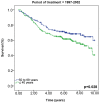Retrospective analysis of breast cancer prognosis among young and older women in a Brazilian cohort of 738 patients, 1985-2002
- PMID: 28101229
- PMCID: PMC5228328
- DOI: 10.3892/ol.2016.5360
Retrospective analysis of breast cancer prognosis among young and older women in a Brazilian cohort of 738 patients, 1985-2002
Abstract
Invasive breast cancer (BC) is infrequent among women aged ≤40 years, however, the disease outlook in these younger patients is generally worse than among older women. The present study aimed to compare socio-demographic, clinical and pathological characteristics, and their association with long-term survival, between two random cohorts of young (≤40 years) and older (50-69 years) Brazilian patients with BC. The cohort comprised of 738 randomly selected women who were diagnosed with BC at Barretos Cancer Hospital, Pio XII Foundation (Barretos, Brazil) between January 1985 and December 2002; the patients included young women (n=376) and older women (n=362). The current analysis suggested that BC in young women is associated with numerous pathological features of aggressiveness. Second cancer and bilateral BC were independent predictors of a poor outcome in the younger group. Furthermore, C-erB-2 was positively correlated with poor outcome in the older group, whereas estrogen receptor status and TNM stage were associated with disease prognosis in both groups. The overall survival rates of the two age groups were similar except when analyzed according the treatment period (1997-2002). Although patients aged ≤40 years harbored tumors with more aggressive clinicopathological characteristics, these characteristics were not independent predictors of overall survival. The present study indicates that medical advances associated with prevention of breast cancer may improve screening programs, which may therefore increase early diagnosis and subsequently lower mortality rates.
Keywords: breast cancer; disease outcome; long-term follow-up; prognostic factors; univariate/multivariate survival analysis; young women.
Figures
Similar articles
-
Advanced Stage at Diagnosis and Worse Clinicopathologic Features in Young Women with Breast Cancer in Brazil: A Subanalysis of the AMAZONA III Study (GBECAM 0115).J Glob Oncol. 2019 Nov;5:1-10. doi: 10.1200/JGO.19.00263. J Glob Oncol. 2019. PMID: 31730380 Free PMC article.
-
Breast cancer under age 40: a different approach.Curr Treat Options Oncol. 2015 Apr;16(4):16. doi: 10.1007/s11864-015-0334-8. Curr Treat Options Oncol. 2015. PMID: 25796377 Review.
-
Expression of LPA2 is associated with poor prognosis in human breast cancer and regulates HIF-1α expression and breast cancer cell growth.Oncol Rep. 2016 Dec;36(6):3479-3487. doi: 10.3892/or.2016.5206. Epub 2016 Oct 26. Oncol Rep. 2016. PMID: 27805252
-
Clinical features and prognostic factors of breast cancer in young women: a retrospective single-center study.Arch Gynecol Obstet. 2023 Mar;307(3):957-968. doi: 10.1007/s00404-022-06670-6. Epub 2022 Jul 15. Arch Gynecol Obstet. 2023. PMID: 35835921
-
[Bilateral breast cancer after Hodgkin disease. Clinical and pathological characteristics and therapeutic possibilities: an analysis of 13 cases].Cancer Radiother. 1997;1(4):300-6. doi: 10.1016/s1278-3218(97)81497-7. Cancer Radiother. 1997. PMID: 9435820 Review. French.
Cited by
-
Validation of the 8th edition of the American Joint Committee on Cancer Pathological Prognostic Staging for young breast cancer patients.Aging (Albany NY). 2020 Apr 22;12(8):7549-7560. doi: 10.18632/aging.103111. Epub 2020 Apr 22. Aging (Albany NY). 2020. PMID: 32320950 Free PMC article.
-
Histological and Immunohistochemical Characteristics for Hereditary Breast Cancer Risk in a Cohort of Brazilian Women.Rev Bras Ginecol Obstet. 2022 Aug;44(8):761-770. doi: 10.1055/s-0042-1743103. Epub 2022 Apr 25. Rev Bras Ginecol Obstet. 2022. PMID: 35468643 Free PMC article.
-
18F-FDG PET/CT radiomic predictors of pathologic complete response (pCR) to neoadjuvant chemotherapy in breast cancer patients.Eur J Nucl Med Mol Imaging. 2020 May;47(5):1116-1126. doi: 10.1007/s00259-020-04684-3. Epub 2020 Jan 25. Eur J Nucl Med Mol Imaging. 2020. PMID: 31982990
-
The impact of young age (< 40 years) on the outcome of a cohort of patients with primary non-metastatic breast cancer: analysis of 10-year survival of a prospective study.BMC Cancer. 2022 Jan 3;22(1):27. doi: 10.1186/s12885-021-09100-z. BMC Cancer. 2022. PMID: 34980002 Free PMC article.
-
Advanced Stage at Diagnosis and Worse Clinicopathologic Features in Young Women with Breast Cancer in Brazil: A Subanalysis of the AMAZONA III Study (GBECAM 0115).J Glob Oncol. 2019 Nov;5:1-10. doi: 10.1200/JGO.19.00263. J Glob Oncol. 2019. PMID: 31730380 Free PMC article.
References
-
- Elkum N, Dermime S, Ajarim D, Al-Zahrani A, Alsayed A, Tulbah A, Al Malik O, Alshabanah M, Ezzat A, Al-Tweigeri T. Being 40 or younger is an independent risk factor for relapse in operable breast cancer patients: The Saudi Arabia experience. BMC Cancer. 2007;7:222. doi: 10.1186/1471-2407-7-222. - DOI - PMC - PubMed
-
- Musolino A, Bella MA, Bortesi B, Michiara M, Naldi N, Zanelli P, Capelletti M, Pezzuolo D, Camisa R, Savi M, et al. BRCA mutations, molecular markers, and clinical variables in early-onset breast cancer: A population-based study. Breast. 2007;16:280–292. doi: 10.1016/j.breast.2006.12.003. - DOI - PubMed
LinkOut - more resources
Full Text Sources
Other Literature Sources


